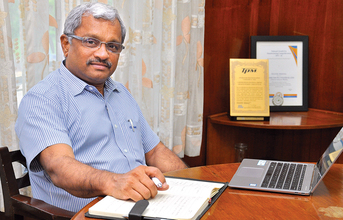
Which are the key industry sectors that you address with more than 20,000 SKUs in your portfolio?
CUMI's products find application in almost all industries that require materials and surface engineering solutions. The abrasives business is a key supplier to the auto OEM, auto components, bearings, steel, tools and general engineering applications among others. The Electro Minerals division, other than being a key supplier to the abrasives and refractories businesses, caters to a wide range of photovoltaic, metallurgical, investment castings, defence, coatings, brake lining, lapping and blasting applications. Iron and steel, power, sanitary wares, tiles, electric components, cement, foundries etc are the major sectors that are served by heat resistant products produced by the Super Refractories division.
Tell us briefly about your overseas presence. Do you also export from India? If yes, then to which markets?
CUMI has strategic presence in important overseas locations, either as a manufacturing partner or as a trading entity - whichever adds value to the firm's operations.
As a global manufacturer, CUMI is present in Russia and South Africa, leveraging significant cost arbitrage in producing Silicon Carbide and Zirconia, due to easy access to raw materials and low cost power at these countries. The high quality grains produced in these facilities, gives a significant competitive advantage to our abrasives and refractories business.
CUMI also has pure trading entities spread across the world in regions such as USA, China, Middle East, Europe, Australia and SE Asia.
How has been the last financial year for the company?
CUMI has reported an increase in consolidated gross sales by 9 percent to Rs. 2,200 cr. in FY 2016-17 compared to Rs. 2,024 cr. in the previous year. Full year consolidated segmental profitability improved for Abrasives and Ceramics businesses, supported by higher sales volume.
Abrasives division at consolidated level registered a growth of 10 percent. The sales for FY 2016-17 were Rs. 1,016 cr. Both Indian and overseas entities had a good growth. Electro minerals division at consolidated level registered a growth of 3 percent. The consolidated sales for FY 2016-17 were Rs. 769 cr. Indian operations registered a growth; however, sales were marginally lower for the Russian entity. Ceramics division registered a growth of 15 percent. For FY 2016-17 the sales were at Rs. 472 cr. The standalone industrial ceramics and refractories businesses delivered a good growth.
How is the GST implementation impacting your business and the overall industry scenario in the country?
GST is a major economic reform. The single tax regime is expected to bring in much needed uniformity and transparency. It also addresses the issue of cascading of taxes (hidden costs
of doing inter-state business - primarily the erstwhile CST)
through a system of seamless tax-credits.
GST is a major economic reform. The single tax regime is expected to bring in much needed uniformity and transparency. It also addresses the issue of cascading of taxes (hidden costs of doing inter-state business - primarily the erstwhile CST) through a system of seamless tax-credits.
From CUMI's perspective, GST would certainly help to optimise our distribution through dealers and sub-dealers, as standard tax rate would imply standard prices of our products through-out the country. Movement of trucks carrying our products has improved and is expected to reduce the lead time and cost of logistics to a significant extent, leading to overall cost of transaction going down. GST should also provide an impetus to domestic manufacturers of mass market products by reducing the arbitrage that imports had on local suppliers due to a complex system of cascading taxes, which has now been streamlined.
Automotive is one of the key focus areas for you. How do you see this industry evolving in terms of its manufacturing processes?
The Automotive industry is indeed an important customer segment, as it is one of the fastest growing sectors in the country and in the present context, is seen as a key manufacturer of automobiles and components for domestic consumption as well as exports. As the automobile industry has matured, it has challenged us to keep learning and developing products that support the trends - precision, evolving component surfaces, productivity and lower costs. The industry demands high grinding speeds with reliable finish for components that require to be produced in mass and be precise. Through our long collaboration with the leaders in the automotive and auto ancillary sectors, we have been continuously involved in identifying the changing needs of the market and designing products created using a wide range of technical, raw material and application engineering capabilities.
CUMI is also working with the automotive industry to address automation of processes through designing ultralightweight and sensor embedded smart products that are compatible with advanced robots and machines.
END



























